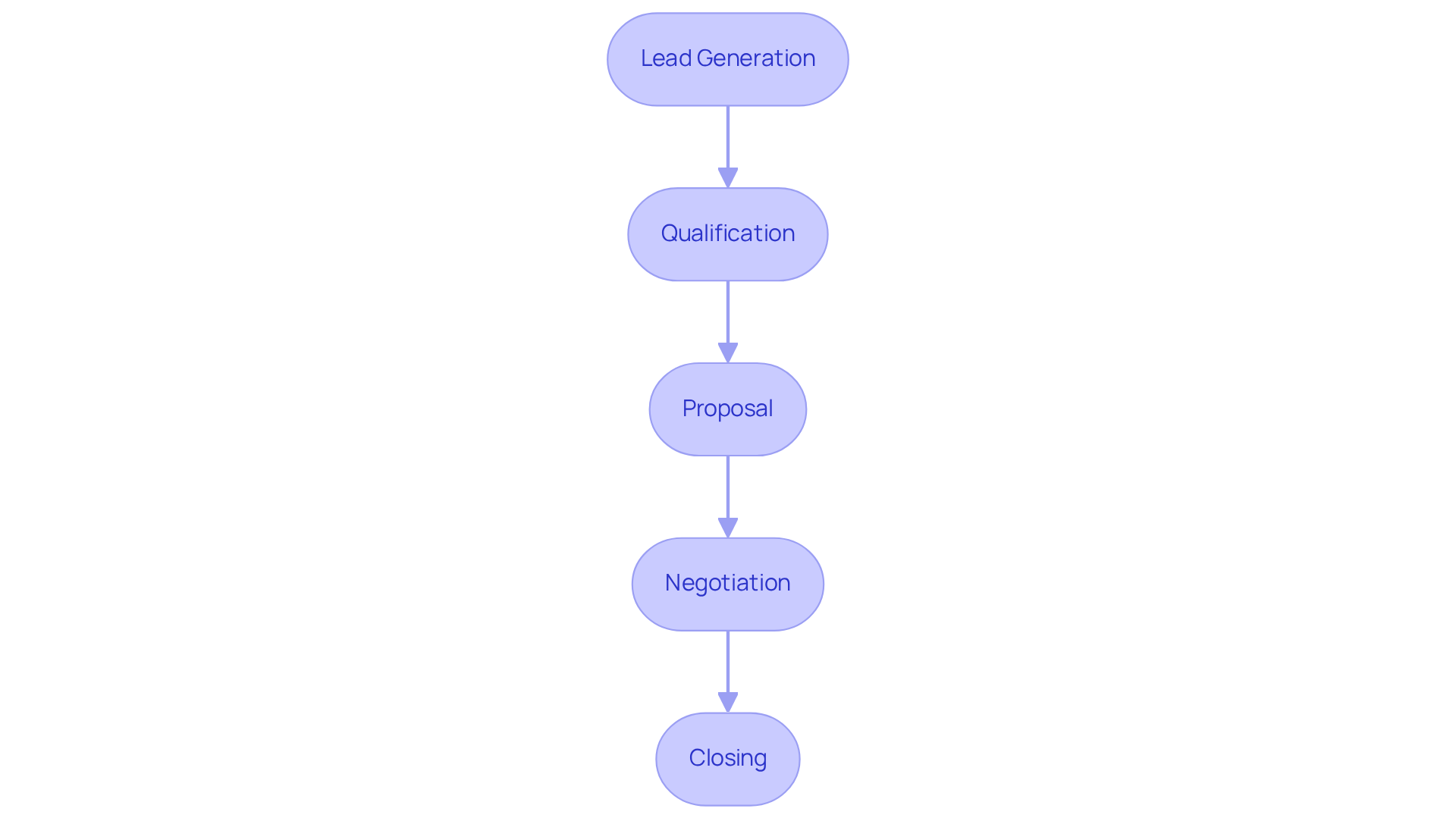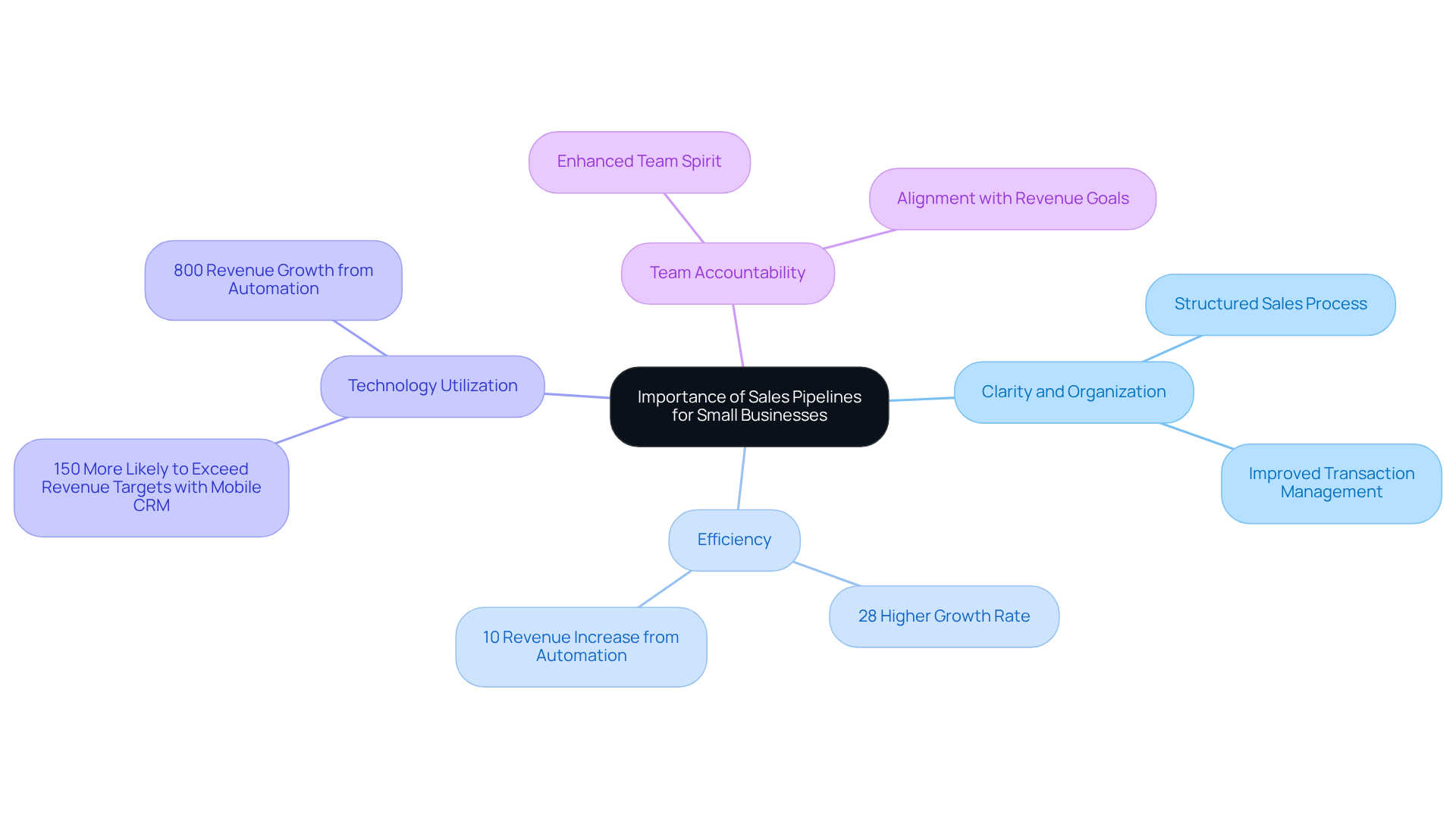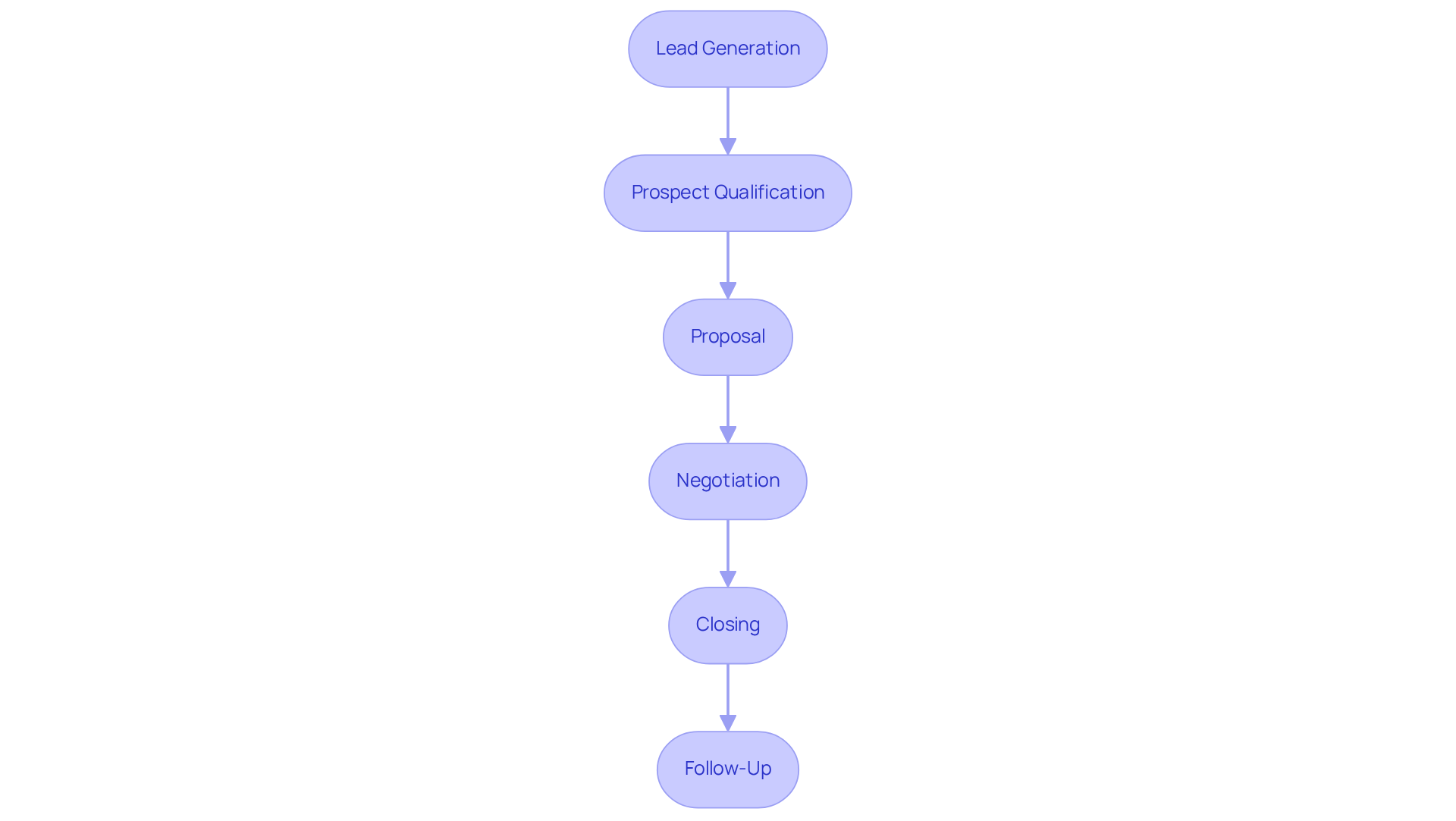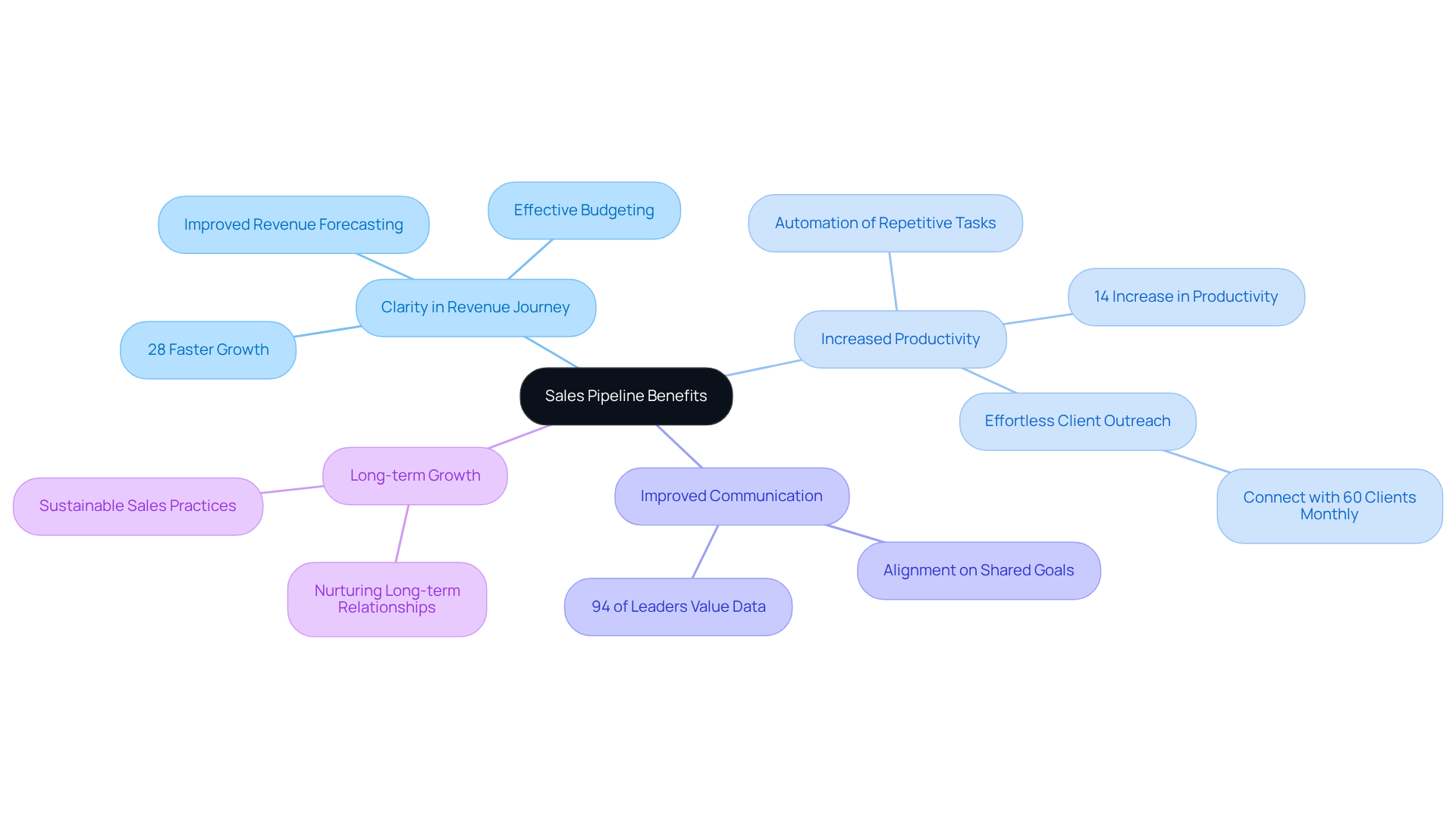Overview
In the world of small business, understanding the sales pipeline is crucial. Have you ever felt overwhelmed by managing leads and closing sales? You're not alone. A well-defined sales pipeline can illuminate the path from lead generation to closing deals, making the customer journey clearer and more manageable.
Imagine this: a structured approach to sales not only enhances clarity but also boosts efficiency and productivity. When you have a clear pipeline, you're better equipped to focus on what truly matters—nurturing your leads and converting them into loyal customers. This clarity can lead to improved conversion rates and revenue growth. In fact, statistics show that businesses using CRM tools often experience better outcomes.
We understand the challenges you face, and we want to empower you with actionable insights. By adopting a robust sales pipeline, you can take control of your sales process and foster meaningful relationships with your customers. Together, we can achieve success and navigate the complexities of the sales journey with confidence.
So, are you ready to enhance your sales strategy? Let's explore how a well-defined sales pipeline can transform your business, bringing you closer to your goals.
Introduction
Understanding the meaning of a sales pipeline in business is essential for small business owners who are navigating the complexities of client acquisition. Visualizing the journey that potential clients take—from lead generation to closing a sale—allows businesses to streamline their processes, enhance efficiency, and ultimately drive growth. However, many small enterprises face challenges in implementing an effective sales pipeline, often leaving them feeling overwhelmed and underperforming.
What strategies can these businesses adopt to not only define their sales processes but also leverage them for sustainable success? By addressing these concerns, we can work together to find solutions that empower you and your business.
Define Sales Pipeline in Business
The pipeline meaning in business refers to a visual structure that outlines the journey potential clients take, from the moment they become aware of a product or service to the point of making a purchasing decision. Common stages include:
- Lead generation
- Qualification
- Proposal
- Negotiation
- Closing
By clearly defining these stages, small businesses can gain valuable insights into their revenue processes, monitor progress, and better understand the pipeline meaning in business to identify areas for improvement. This organized approach not only helps in managing commercial activities but also plays a crucial role in understanding the pipeline meaning in business, which enables companies to allocate resources effectively and refine their strategies.
The importance of a well-defined sales process is underscored by data revealing that 51% of small businesses using a CRM experience improved conversion rates. Additionally, 27.8% of users identify lead management and retention as the primary use cases for CRMs, highlighting the essential role of efficient workflow management in achieving organizational goals. As Brian Tracy wisely advises, 'Maintain your revenue stream by prospecting consistently. Always have more people to see than you have time to see them.' This proactive approach is vital for small business owners who aspire to enhance their client acquisition efforts and foster growth.
Reflecting on these insights, we understand your challenges and the importance of taking actionable steps. Together, we can achieve success by adopting these strategies and nurturing your understanding of pipeline meaning in business.

Contextualize the Importance of Sales Pipelines for Small Businesses
For small enterprises, having a clearly outlined sales process is essential, as it relates to the pipeline meaning in business for several reasons. It brings clarity and organization to what can often feel like a chaotic transaction process, which is particularly important for owners juggling multiple responsibilities. A streamlined approach to client acquisition not only simplifies operations but also boosts efficiency. Have you ever felt overwhelmed by the sales workflow? Sales funnels illustrate the pipeline meaning in business by helping companies identify obstacles in their sales processes, which enables prompt actions that can significantly improve conversion rates. For instance, businesses that effectively manage their revenue streams experience a 28% higher growth rate.
Moreover, companies utilizing mobile CRM tools are 150% more likely to exceed their revenue targets, showcasing the advantages of harnessing technology in sales management. This structured revenue process fosters accountability within small teams, as each member can grasp the pipeline meaning in business by seeing their contribution toward achieving overall revenue goals. This organized approach not only strengthens team spirit but also aligns efforts with revenue objectives, ultimately leading to enhanced performance and growth.
Consider the story of a charming bed and breakfast in France that saw its income grow after implementing automation software. This highlights how efficient management of customer transactions can lead to significant revenue expansion. Additionally, early adopters of sales automation report potential revenue increases of up to 10%, further emphasizing the financial benefits of a structured sales process. Together, we can navigate these challenges and pave the way for success.

Identify Key Components and Stages of a Sales Pipeline
A typical sales pipeline consists of several key components and stages that are essential for effective lead management and conversion:
-
Lead Generation: This initial stage involves identifying potential customers through various channels such as social media, referrals, and marketing campaigns. We understand that companies actively participating in prospect generation can observe a substantial rise in their sales, which reflects the pipeline meaning in business. In fact, businesses employing AI have reported up to a 50% enhancement in prospect acquisition.
-
Prospect Qualification: Here, prospects are evaluated to ascertain their potential as customers based on factors such as budget, need, and authority. It’s important to recognize that effective prospect qualification can enhance conversion rates, as nurtured prospects tend to spend 47% more than those who are not nurtured.
-
Proposal: In this stage, customized solutions are presented to eligible prospects, often including pricing and terms. This is crucial for addressing specific customer needs and demonstrating the value your business can provide.
-
Negotiation: Engaging in discussions to address any concerns or objections from the prospect is vital. This stage aims to reach a mutually beneficial agreement, and effective negotiation strategies can lead to higher success rates.
-
Closing: Completing the transaction and turning the prospect into a customer is the focus here. Quick follow-up during this phase can significantly increase conversion rates, with responses made within five minutes boosting conversions by up to nine times.
-
Follow-Up: Post-sale engagement is essential for ensuring customer satisfaction and exploring opportunities for upselling or referrals. Regular follow-up can result in heightened customer loyalty and repeat transactions. It’s noteworthy that 80% of new prospects do not transform into purchases without adequate nurturing.
Every phase of the sales process demands particular strategies and tools to enhance efficiency. Grasping these elements is essential for small enterprise owners seeking to improve their revenue processes and foster growth. Together, we can navigate these stages and achieve success.

Explore Benefits of a Sales Pipeline for Client Acquisition
Establishing a revenue process can truly transform your approach to customer acquisition, especially for small enterprises like yours. It brings clarity to the revenue journey, enabling you to monitor progress and make informed, data-driven decisions. This clarity is vital for accurate revenue forecasting, which in turn supports effective budgeting and strategic planning. Did you know that companies that enhance their management practices grow 28% faster than their peers? This statistic underscores the importance of a structured approach to your business.
Moreover, a well-defined revenue process boosts productivity by automating repetitive tasks, ensuring timely and relevant follow-ups. For instance, platforms like Wayy.ai empower small business owners to manage outreach efforts effortlessly, allowing you to connect with over 60 potential clients each month without the burden of manual intervention. Additionally, sales teams that embrace automation experience a 14% increase in productivity, further illustrating the efficiency gains from a well-executed process.
A streamlined workflow also fosters improved communication among sales teams, aligning everyone on shared goals and strategies. As Salesforce notes, "94% of business leaders believe their organization should be deriving more value from their data," highlighting the necessity for effective process management. Ultimately, the benefits of a sales pipeline highlight the pipeline meaning in business, as they extend beyond immediate sales results to nurture long-term growth and sustainability. Together, we can pave the way for your success.

Conclusion
Understanding the pipeline meaning in business is crucial for small business owners like you who are eager to enhance your sales processes and drive growth. By clearly defining the stages of a sales pipeline—from lead generation to closing—you can streamline your operations, improve efficiency, and ultimately boost your conversion rates. This structured approach not only clarifies your sales journey but also empowers you to make informed decisions that align with your revenue goals.
Throughout this article, we’ve shared key insights that emphasize the importance of a well-defined sales pipeline. Each stage—lead generation, qualification, proposal, negotiation, closing, and follow-up—plays a vital role in nurturing prospects and converting them into loyal customers. Did you know that businesses employing effective sales management strategies can experience significantly higher growth rates and improved productivity? This underscores the transformative impact of a structured sales process.
In conclusion, embracing a sales pipeline is not merely a tactical move; it is a strategic necessity for small businesses aiming for long-term success. By investing time and resources into understanding and implementing a sales pipeline, you can navigate the complexities of client acquisition with greater confidence. The journey toward enhanced revenue and sustainable growth begins with a clear understanding of the pipeline meaning in business—taking actionable steps today can lead to significant rewards tomorrow.
Frequently Asked Questions
What is a sales pipeline in business?
A sales pipeline is a visual structure that outlines the journey potential clients take, from becoming aware of a product or service to making a purchasing decision.
What are the common stages of a sales pipeline?
The common stages of a sales pipeline include lead generation, qualification, proposal, negotiation, and closing.
How can defining sales pipeline stages benefit small businesses?
Clearly defining sales pipeline stages allows small businesses to gain insights into their revenue processes, monitor progress, identify areas for improvement, and manage commercial activities effectively.
What impact does using a CRM have on small businesses?
Data shows that 51% of small businesses using a CRM experience improved conversion rates, and 27.8% of users identify lead management and retention as primary use cases for CRMs.
Why is it important for small business owners to maintain a consistent prospecting approach?
A consistent prospecting approach is vital for maintaining a revenue stream and enhancing client acquisition efforts, which are essential for fostering growth.
What actionable steps can small businesses take to understand pipeline meaning in business?
Small businesses can adopt strategies to define their sales pipeline stages, monitor their processes, and refine their resource allocation to achieve success.




